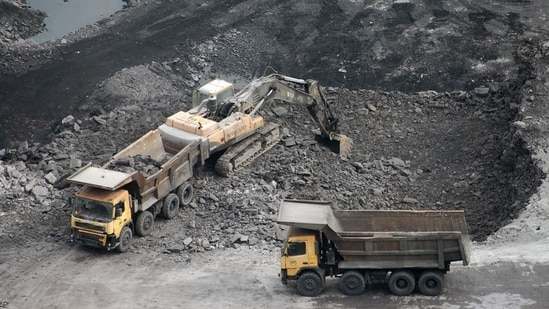New Delhi, May 13:
The Union environment ministry has relaxed the mandatory compliance norms for coal mining expansion projects citing higher demand for coal amid an ongoing power crisis — a move that has been criticised by environmentalists, especially since the coal ministry has said there is no shortage of coal in the country.
According to the revised norms, coal mines with environmental clearances (EC) to expand by 40%, can now expand by up to 50% without any environment impact assessment or public consultation.
In an office memorandum (OM) dated May 7, the environment ministry said the change was made after the coal ministry raised an alarm regarding pressure on domestic coal supply.
“The ministry is in receipt of a request from the ministry of coal stating that there is huge pressure on domestic coal supply in the country and all efforts are being made to meet the demand of coal for all sectors,” the OM stated. “It has been requested that existing coal blocks should be allowed for expansion of production capacity keeping in view the available reserves in the coal block and compliance of the conditions of the previous EC.”
“Considering the exigency that has arisen, it has been decided, as a special dispensation, that those coal mining projects which have been granted expansion of EC up to 40% of the original EC capacity as per provisions of earlier OMs, shall be granted expansion EC to increase their production capacity to 50% of original EC capacity,” stated the OM, a copy of which HT has seen. This is on condition that the mining continues to be in the same lease area and available coal reserves, it added.
The ministry has also said that the special dispensation is being provided for a period of six months from the date of issuing the OM (May 7).
To be sure, the coal ministry has repeatedly clarified that the ongoing power crisis was not due to the shortage of coal but non-payment of dues to Coal India Ltd by the states, delays in lifting coal, and poor planning.
The process of easing environmental norms for expansion of coal mines started in 2017. The environment ministry in an OM dated September 15 that year exempted expansion of coal mining projects up to 40% in two to three phases from public hearing. The ministry issued another OM on April 11 this year, stating that public hearing was exempted for up to 50% expansion but in stages. Instead, a public consultation was recommended for which responses from affected communities were to be taken in writing.
With the latest OM up to 50% expansion of coal mines has been exempted from public consultation, environment impact assessment and submission of environment management plan.
“This is being done to address the current coal crisis and to release the pressure created by the coal shortage. There are not many such proposals that want expansion up to 50%. At present, only 11 mines need to expand to up to 50%,” said a senior official of the environment ministry, requesting anonymity. “The dispensation is being made only for six months. So, we do not expect any major environmental impacts due to this relaxation.”
Experts said the move and reasons behind it have not been explained to people who are likely to be impacted by coal mine expansions.
“The OM allows an additional 10 percentage point expansion not just without public hearings, but also without impact assessments. While the environment ministry has acknowledged the coal crisis, it is important to recognise that mine expansions are taking places in areas with long-standing problems pertaining to jobs, pollution and unfulfilled rehabilitation,” said Kanchi Kohli, legal researcher at the Centre for Policy Research. “These changes are likely to only exacerbate local conflicts further, as regulatory agencies are not attempting to explain the rationale behind the decisions to people who are likely to bear the impact of coal-mine expansions.”
Meanwhile, the environment ministry’s forest conservation division has allowed mining leases, which were cancelled or terminated to be transferred to new lease holders still under consideration by states or Centre, without having to apply for a fresh forest clearance.
The Karnataka government had sought clarity from the Centre on whether cancelled leases can also be considered for such transfer of forest clearance to new lease holders. The environment ministry, in a letter dated April 27 and addressed to principal chief conservator of forests of all states and Union territories, clarified that all mines whose leases had either expired or terminated could be handed over to new leaseholders.
On July 7, 2021, the ministry issued guidelines on transfer of forest clearances of expired mining leases. The exemption was meant to facilitate smooth handover of mines currently being auctioned in states such as Chhattisgarh, Jharkhand, Odisha, Madhya Pradesh, Maharashtra and Andhra Pradesh.
With the ministry’s clarification, mines in Goa and Karnataka whose leases were cancelled by the Supreme Court can restart mining.
HT reported last week that the Goa government issued notices to 88 iron ore mines, whose leases were cancelled by the Supreme Court in 2018, to remove their machinery and equipment from the mines. Once the state government takes control of the mines, it will have the power to restart mining, according to the rules under which the notices have been issued. The government has given the leaseholders one month to vacate.
“There is an underlying assumption that the proponent seeking forest diversion approval will eventually be the beneficiary of the mine lease transfer. It remains a missed opportunity to recognise the legacy of socio-ecological impacts that may have piled up due to years of unresolved illegalities. There is a serious need to address substantive issues rather than treat these transfers as procedural formalities,” Kohli said.




